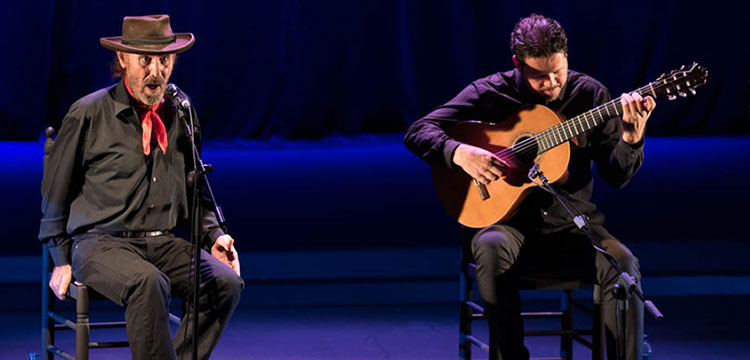The singer gave the Flamenco Madrid concert that had been suspended after he suffered a stroke
José Manuel Gómez Gufi
“Music serves a purpose, everything else is nearly worthless” said Eduardo Punset, a thinker who probably never heard El Cabrero. The people who go to hear El Cabrero are not flamenco fans, they’re people who go to a recital the way someone would go to the trenches to gather up strength with comrades, they go to hear something they need to hear in order to keep on fighting, and also to honor one person who has never been silenced, always faithful to his spirit and emphatic in his convictions.
“Freedom is my country, reason is my flag, truth is my path. That’s my way of seeing things”. When El Cabrero sings that verse of fandangos, people applaud wildly as if their lives depended on it. “If the land could speak, it would sing fandangos like Cabrero” Kutxi Romero told me the other day, one of his most fervent followers who one day did a version of “como el viento de poniente” with his group Marea, and his audience filled up with long-haired dudes. There weren’t many at the Teatro Fernán Gómez, but don’t trust hair issues, because there were people of all ages who went to hear El Cabrero as if they were attending a political gathering “of one of our own”, prepared to take “the Winter Palace” as soon as the temperature drops a bit.
This year and next, El Cabrero is doing his goodbye tour of the stage. His Madrid concert that was to have opened the Flamenco Madrid festival programed by Niño de Elche, and which had to be cancelled due to a stroke that had the singer hospitalized, was mentioned by José Domínguez in a way that was as crude as it was poetic.
El Cabrero’s literature is as peculiar as his look, halfway seated on a wicker chair, he does the first verse of soleá, and until it’s finished he doesn’t use his hands for help with the following verse. The left hand guides the voice, the right one rests on his leg or the chair, he briefly sings with both hands in the air, like a child riding a bike for the first time, knowing the importance of balance.
“Let’s see how we do with malagueña”, and he sings as only El Cabrero does, then he moves on to other areas. The passage of time has tempered his movement on stage. This triggers a reaction from the audience he’s trying to encourage. At times he makes way for the guitarist, Manuel Herrera, as if he no longer were in a hurry to blurt out his singing. He announces fandangos, and we hear the verse: “not one single euro for the clergy”, and when he finishes the republican verse, the audience erupts in applause as if this were a political transition and they were applauding the moment.
And it’s time for “Luz de Luna”, one of his most famous songs which in those years translated into Chavela Vargas trying to do away with the tequila supply. And José Domínguez gets up from his chair to show thanks for the applause, slowly leaving the stage which now appears huge, while the audience stays put, asking for more, and from the back someone shouts out that you can’t ask more from this man. And as people start filing out, Cabrero returns and we retrace our steps. And again that voice sounds.
Don’t ever stop singing Cabrero!
Video & photos: MJ. Lara
